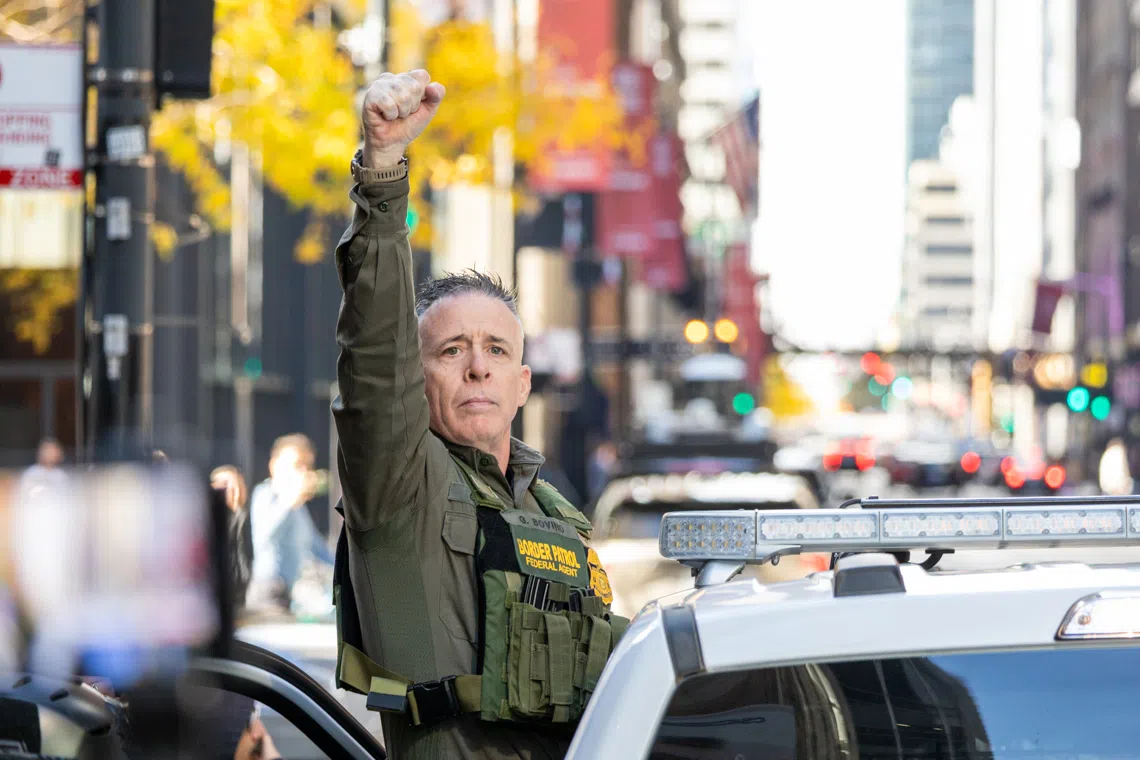CHICAGO — Federal agents carrying out the Trump administration’s “Operation Midway Blitz” immigration enforcement campaign will be indefinitely restricted from using riot control weapons like pepper balls and tear gas without adequate justification and warning after a federal judge’s ruling Thursday.
U.S. District Judge Sara Ellis said she’d seen “ample evidence that agents … intended to cause protesters harm” during a number of clashes between the feds and members of the public that ended with the deployment of tear gas and left bystanders fearful and, in some cases, injured.
“I see little reason for the use of force that the federal agents are currently using,” the judge said Thursday. “Pointing guns, pulling out pepper spray, throwing tear gas, shooting pepper balls and using other less-lethal munitions do not appear to be appropriate.”
Before formally issuing her preliminary injunction, Ellis catalogued more than a dozen incidents in which immigration agents used excessive force against members of the public. While some stretched back to September when protests outside of the U.S. Immigration and Customs Enforcement processing facility in the Chicago suburb of Broadview were at their peak, the majority of the clashes the judge described occurred after she’d already issued a temporary restraining order governing agents’ use of force.
That Oct. 9 order stems from a lawsuit filed last month by protesters, journalists and clergy, mostly pertaining to their treatment by agents outside the Broadview facility. In one widely publicized instance on Sept. 19, the Rev. David Black was hit with multiple pepper balls an agent shot from the building’s roof, including twice in the head. During a marathon hearing in Ellis’ courtroom Wednesday, Black testified that he had reservations about going back to protest at Broadview after the incident.
But since the suit’s filing, neighborhood-level confrontations have become more common between civilians and agents carrying out arrests of undocumented immigrants.
The judge’s temporary restraining order prohibited the use of tear gas, pepper balls, rubber bullets, flashbang grenades and tasers on protesters who don’t pose “an immediate threat to the safety of a law enforcement officer or others.” For protesters deemed true threats, the order required them to give at least two separate warnings loud enough for the crowd to hear and allow “reasonable time and opportunity” for compliance before the deployment of a riot control weapon.
But Ellis on Thursday said that over and over, the Department of Homeland Security’s own evidence — including body camera footage — did nothing to refute testimony that agents gave no warnings before throwing canisters of tear gas or using other force against members of the public.
The judge pointed multiple times to an Oct. 23 clash between agents and a group of spontaneous protesters in Chicago’s Little Village, a neighborhood heavily populated by Mexican immigrants. During the incident, U.S. Customs and Border Patrol Commander Gregory Bovino personally deployed canisters of tear gas, including over the heads of the crowd in direct violation of Ellis’ order.
The Border Patrol Commander has become the face of Operation Midway Blitz, though it’s ostensibly an ICE operation.
After the Little Village episode, DHS officials and Bovino himself claimed his use of tear gas was justified because someone threw a rock at his head. He even repeated it during a sworn deposition he was ordered to give last week. But as that deposition stretched into a third day, Bovino finally acknowledged he wasn’t hit until after the tear gas deployment.
Excerpts from the video deposition were played during Wednesday’s hearing, which also included live testimony from nearly a dozen others.
“Tellingly, defendant Bovino admitted that he lied,” the judge said Thursday.
‘Simply not credible’
But Ellis was frustrated that Bovino refused to acknowledge his own use of force captured in video footage of an Oct. 3 protest outside the Broadview ICE facility. In the video, Bovino can be seen tackling a man named Scott Blackburn to the ground before arresting him. But when Bovino was shown the video during his deposition, he denied that he used any force in that instance, instead testifying that “the use of force was against me.”
The judge said the video “obviously” shows Bovino tackling Blackburn “to the ground.” Ellis expressed amazement that “Bovino, despite watching this video, said that he never used force against Mr. Blackburn,” she said. The Border Patrol commander also testified that every use of force he was aware of agents committing during Operation Midway Blitz was “more than exemplary.”
But it wasn’t just Bovino’s view of events the judge couldn’t square with testimony and video footage. Ellis said that after reviewing “all of the evidence” in the case, the Trump administration’s evidence was “simply not credible.”
“The government would have people believe … that the Chicagoland area is in a vice hold of violence, ransacked by rioters and attacked by agitators,” the judge said. “That simply isn’t true. And the government’s own evidence in this case belies that assertion.”
Ellis’ words echoed language used by U.S. District Judge April Perry last month when she blocked the Trump administration from deploying the National Guard to Chicago to protect immigration agents from protesters that DHS officials called “violent” and “rioters.”
Perry ruled there was “no credible evidence that there is a danger of rebellion in the state of Illinois,” also noting the Department of Justice’s arguments in the case seemed to add to “a growing body of evidence that DHS’ version of events are unreliable.”
Ellis’ new injunction is substantially similar to her Oct. 9 order, though it also includes a new prohibition on chokeholds or other types of neck restraints unless absolutely necessary to stop someone from seriously injuring or killing another.
The judge also modified her initial order last month to require agents wearing body cameras to have them turned on. Until last week, that didn’t include Bovino. But after telling Ellis he’d never been issued a body-worn camera nor received training on how to use it, the judge ordered him to start using one.
First Amendment violations
Ellis monologued for more than an hour, rebuking the Trump administration for “indiscriminately” using force against those who loudly oppose the president’s immigration enforcement agenda. As the hearing drew to a close, she quoted President George Washington, who in 1783 warned that if “the freedom of speech may be taken away … dumb and silent we may be led, like sheep, to the slaughter.”
The judge cited an impromptu Oct. 3 speech from DHS Secretary Kristi Noem to federal agents assigned to Operation Midway Blitz encouraging them to “go hard” against protesters.
“What they are doing is advocating to harm not just you and your colleagues, but your families,” Noem said. “They’re doxing your identities and victimizing people every day by the way that they are talking, speaking, who they are affiliated with, who they’re funded with and what they’re talking about as far as consequences for what we’re doing by protecting this country.”
Ellis said Noem’s speech indicated “content-based restrictions” of protesters’ First Amendment rights, as DHS officials “do not deny they would treat pro-ICE demonstrators more favorably.”
But the judge said Noem’s words also fit the Trump administration’s pattern of attempting to justify use of force by painting a dark — and inaccurate — picture of a violent Chicago.
Ellis opened with reading the entirety of poet Carl Sandburg’s most famous work proclaiming the city as “hog butcher for the world,” emphasizing a line aimed at “those who sneer at this, my city.”
Instead, the judge said the Chicago she knew was made up of “everyday people standing watch to protect the most vulnerable among us.” However, Ellis noted that federal agents saw those same people as “professional agitators” based on their use of bicycles and whistles to alert others to immigration enforcement activity nearby.
“Describing rapid response networks, neighborhood moms as professional agitators shows just how out of touch these agents are,” she said.
The Trump administration on Thursday vowed to appeal Ellis’ order, calling it “an extreme act by an activist judge that risks the lives and livelihoods of law enforcement officers.”
But Steven Art, an attorney for the plaintiffs, said the administration “is all bark and just a little bit of bite,” arguing litigation has produced “some level of compliance.” He cited agents’ lack of tear gas deployment since Bovino began his multi-day deposition last week.
“They’re publicly saying they don’t give a damn,” Art told reporters after Ellis delivered her ruling. “But they care.”
Capitol News Illinois is a nonprofit, nonpartisan news service that distributes state government coverage to hundreds of news outlets statewide. It is funded primarily by the Illinois Press Foundation and the Robert R. McCormick Foundation.





